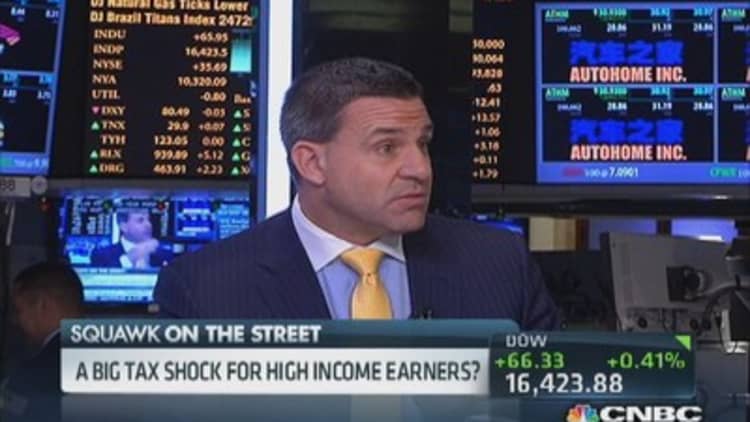The "fix" for the Alternative Minimum Tax in the American Taxpayer Relief Act signed early last year might seem like one of the few bright spots of the legislation for taxpayers.
It permanently indexed the AMT exemption amount — currently $51,900 for single taxpayers and $80,800 for couples — to inflation and did the same for the exemption phaseout thresholds for higher-income taxpayers.
That's good news for the approximately 20 million Americans who've relied on Congress to approve an annual "patch" that's helped them avoid getting hit by the hated tax for much of the last decade. That yearly drama, at least, is now a thing of the past.
But the bill was no fix at all for the roughly 3.9 million taxpayers who are still expected to be liable for an average AMT payment of more than $6,600 in the 2013 tax year. The Tax Policy Center, the research body that is a joint venture of the Urban Institute and Brookings Institution, estimates that the number of taxpayers subject to the AMT for 2013 will drop by about 300,000 — but that's largely because more Americans' regular tax bills will be higher.
The process of calculating the parallel tax computation, and the rules for what things can and cannot be deducted from income for AMT purposes, were both left unchanged. Thus, mortgage interest can be deducted, while state and local taxes can't. Charitable contributions are OK, but exemptions for dependent children are eliminated.
The upshot is that if you've been hit by the AMT in the recent past, there's a good chance you could be this year, too.
Read MoreAdvisors rein in risk-hungry clients
"The legislation didn't change the group of people likely to be subject to the AMT," said Mel Schwarz, a partner in the Washington National Tax Office of Grant Thornton. "It preserved the status quo."
That status quo continues to be the object of intense criticism.
The Taxpayer Advocate Service, an independent office within the Internal Revenue Service, has been calling for the repeal of the AMT since 2002, arguing it "hits the wrong taxpayers," "penalizes families" and "treats seemingly similar deductions differently." The repeal of the AMT topped the TAS's list of five recommendations to Congress in its recently filed 2013 annual report.
While the AMT was originally drafted to prevent a very small group of high-income taxpayers from avoiding taxes altogether, over the years it has morphed into a tax regime that hits more upper-middle-income families — for no apparent public-policy reason. The taxpayers now most likely to be liable for AMT payment are people with big families who live in high-tax states.
"Far and away, the biggest cause of people having to pay the AMT is their not being able to deduct state and local taxes," said Tim Speiss, vice president of EisnerAmper Wealth Planning and co-chairman of the accounting firm's New York tax practice.
Individuals can't deduct their local taxes for AMT purposes, nor can they claim exemptions for dependent children. The result is that people with large families often get hit with additional AMT payments. Taxpayers in high-tax states such as New York or California face the double whammy of, first, high state taxes and then AMT payments on the federal level.
"While it is hard to imagine the drafters of the original AMT provision would view the expenses of having children or paying local taxes as tax-avoidance loopholes, that is how those expenses are treated today," the TAS report stated.

Despite widespread criticism of the AMT, there appears little chance of it being scrapped. It is a significant source of revenue for the government, expected to bring in $25.6 billion in revenue for the 2013 tax year and $386 billion over the next 10 years, according to Tax Policy Center estimates.
Given the current nature of budgetary politics, the loss of significant revenue from one place has to be offset by increasing revenue somewhere else. That will require broader tax reform.
Read MoreThe world is the savvy investor's oyster
Judging by the tepid reaction to the recent reform proposal from House Ways and Means Committee Chairman David Camp — which called for repeal of the AMT — that isn't likely to happen anytime soon.
"The AMT is now a permanent revenue stream for the government," Speiss said. "From a public-policy perspective, the AMT is here to stay."




